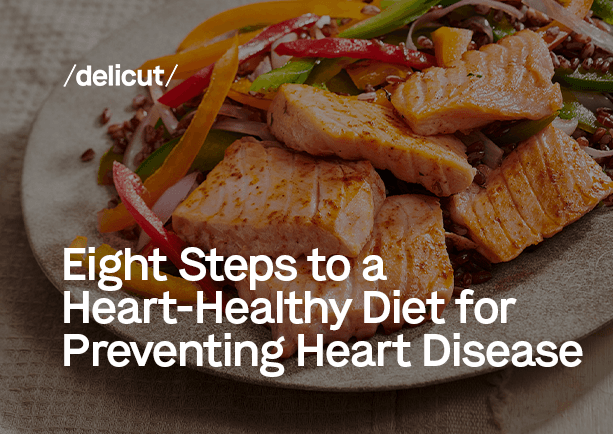Eight Steps to a Heart-Healthy Diet for Preventing Heart Disease

In a world where heart diseases loom large as one of the leading causes of mortality, it's imperative to recognize the vital link between our eating habits and cardiovascular health. Unhealthy food choices and sedentary lifestyles often pave the path to heart disease.
But don't worry! Embracing a heart-healthy diet is the key to reducing the risk of such ailments and promoting overall well-being.
For those residing in the vibrant city of Dubai or visiting as tourists, navigating the sea of tempting junk food options may pose a challenge. However, fear not, for we stand as your unwavering support system! Backed by genuine research, this article unveils eight invaluable steps toward embracing a heart-healthy diet.
Whether you're a devoted health enthusiast or just embarking on this transformative journey, these steps promise to equip you with practical insights and invaluable tips, enabling you to make informed and conscious choices that prioritize the well-being of your heart.
Step 1: Assess Your Current Diet
If you wish to embark on a healthier lifestyle and prioritize your heart's well-being, it is crucial to assess your dietary choices. Although it may need to be more visually appealing, the effort is precious. Begin by maintaining a weekly food journal, diligently recording each meal, snack, and beverage you consume, along with specific timestamps and portion sizes.
This practice will enable you to identify areas that require improvement and empower you to make informed decisions about your dietary selections. According to research published in the Journal of the Academy of Nutrition and Dietetics, a strong link exists between keeping a food diary for six months and successfully reducing heart disease risk factors and weight.
Step 2: Cut Back on Saturated and Trans Fats
To keep your heart healthy, you must know that trans and saturated fats can be harmful. It's crucial to understand that trans and saturated fats might harm your heart health. They can increase your risk of heart disease and boost your cholesterol levels.
Saturated fats, commonly found in fatty meats, full-fat dairy products, and coconut oil, are primarily responsible for contributing to heart problems.
Furthermore, it is crucial to avoid eating processed foods, fried items, and baked foods; these are full of trans fats. Fortunately, numerous delicious alternatives are available that won't block your arteries or interfere with your cravings.
Replace fatty meats with lean meat, chicken, or fish. To promote a healthy heart, consume plenty of fruits, vegetables, whole grains, and legumes instead of processed and fried foods.
Numerous studies, including one published in the New England Journal of Medicine, have demonstrated that by avoiding saturated and trans fats and including healthier fats like polyunsaturated and monounsaturated fats, you can significantly reduce the risk of heart disease.
Step 3: Choose Heart-Healthy Protein Sources
Unlock the secret to a healthier heart! Protein, the powerhouse nutrient for tissue repair and growth, holds the key. But not all proteins are equal regarding your heart's well-being. Opt for heart-friendly protein sources like lean meats, omega-3-rich fish, and lean chicken, which can lower cholesterol and fight inflammation.
Remember the plant-based superfood! Legumes, nuts, and seeds burst with heart-loving fibers, vitamins, and minerals. Fuel your ticker with these choices, and let your heart beat joyfully.
For a convenient solution, explore the world of Delicut meal delivery services in Dubai, ensuring you effortlessly incorporate these heart-healthy protein sources into your daily routine.
Step 4: Add More Fruits and Vegetables to Your Diet
Nourish your heart and fuel your well-being with the rich goodness of fruits and vegetables. These nutritional powerhouses are key to maintaining a healthy heart and overall vitality. Boost your heart health by incorporating more of these nature's wonders into your diet, as they effectively lower blood pressure, combat inflammation, and enhance cardiovascular well-being.
According to the Centers for Disease Control and Prevention, ample consumption of fruits and veggies reduces the risk of heart disease. Nourish your heart with colorful fruits and vegetables! Try to consume 1.5-2 cups of fruit and 2-3 cups of veggies daily. Unlock vibrant health and let your heart thrive!
Revitalize your meals with the goodness of fruits and veggies! Make them a delightful addition to every dish. Start your day by sprinkling fruit on your cereal or oatmeal, adding veggies to your omelet, and savoring a side salad's freshness with both lunch and dinner.
Step 5: Choose Whole Grains
Elevate your heart health by embracing the power of whole grains! Unlike refined grains, whole grains offer a treasure trove of nutrients and fiber, as they retain all parts of the grain.
Scientific studies unveil a healthier link between consuming more whole grains and lowering the risk of heart disease. Add whole wheat, oats, quinoa, brown rice, or barley to your diet. Move forward with the healthful flavor of whole grains to a healthier heart!
Unleash the heart-loving power of whole grains! They do wonders for lowering cholesterol and improving heart health, as they are full of vital vitamins, minerals, and fiber. When dining out or ordering food, prioritize options that feature whole grains.
In Dubai, you can explore healthy meal delivery services with Delicut, which offers delightful whole-grain menus.
Step 6: Limit Sodium Intake
Empower your heart health by controlling sodium intake! Elevated sodium levels can heighten blood pressure, a crucial risk factor for heart disease. Prioritize a low-sodium approach whenever possible to keep your heart in top shape.
The NHS advises adults in the UK to intake 6 grams of salt daily, equivalent to about 2.4 grams of sodium. If you want to reduce your sodium intake, avoid using salt shakers and choose packaged foods that are low in sodium.
Take control and safeguard your heart through mindful sodium management! Pay attention to the sodium content on the label and choose items with less than 120 mg per serving. Avoid high-sodium foods such as canned soups, processed meats, and packaged snacks.
Instead, embrace the goodness of fresh fruits, vegetables, lean proteins, and whole grains, naturally low in sodium.
Step 7: Cut Back on Added Sugars
Be aware of the intake of excessive added sugar consumption! Excessive sugar intake heightens the chances of developing type 2 diabetes, heart disease, and obesity. Stay mindful and prioritize your health.
The natural sugars of fruits and dairy products are much less toxic than those added to meals and beverages during processing or preparation. Safeguard your health by studying food labels and selecting products with less than 5 grams of added sugars per serving. Be watchful and avoid the hidden risks of added sugars!
Skip the added sugars! Steer clear of sugary drinks, baked goods, and processed foods like cereal and yogurt. Opt for water or herbal tea instead of soda or energy drinks. Snack on fresh fruit or unsweetened yogurt. In baking, swap sugar for natural sweeteners like honey or maple syrup. Prioritize your well-being with intelligent choices!
Step 8: Make Small Changes and Stick to Them
It can be challenging to start making significant dietary adjustments, primarily if you're used to eating a certain way or have a hectic lifestyle. Setting achievable goals is the key. Start by reducing your fast food intake to once or twice a week, for instance, if you typically eat it. Aim to include one serving daily to increase fruit and vegetable intake. Take small steps to become healthier!
Take a focused approach now! Start by targeting one aspect of your diet at a time. Reduce sugary drinks for a week or two, then gradually lower your sodium intake. Discovering healthy substitutes for your favorite foods is key. In Dubai, Delicut offers whole-grain menu options, so you may gradually switch to a healthy diet plan guilt-free.
Balance is essential, so enjoy the desired food periodically while prioritizing healthy choices.
FAQs
1. How can I make my heart strong?
To strengthen your heart, focus on adopting a healthy lifestyle. Engage in regular physical activity, Maintain a stress-free lifestyle, sleep well, eat a balanced diet of fruits that are good for the heart, vegetables, healthy grains, and lean proteins, and avoid smoking. These steps get you towards a stronger and healthier heart.
2. What foods reduce heart attacks?
Intake of certain foods can help to lessen the risk of heart attacks. Incorporate fatty fish like salmon, mackerel, and sardines for omega-3 fatty acids. Include leafy greens, whole grains, berries, nuts, olive oil, legumes, and moderate amounts of dark chocolate with high cocoa content. Remember, a balanced diet and healthy lifestyle choices are essential in reducing the risk of heart attacks.
3. Which drink is good for the heart?
Consider green tea as a heart-healthy beverage. It is rich in antioxidants and polyphenols, which may help improve heart health. Due to its antioxidant content, moderate consumption of red wine associates it with some heart benefits.
However, it's important to note that maintaining a balanced diet and overall healthy lifestyle choices are more crucial for heart health than relying solely on any specific drink.
Trending Searches:
Meal Plan Dubai | Affordable Meal Plans Abu Dhabi | Meal Plan Ajman | Meal Plan Al In | Meal Plan Sharjah | Meal Plan Subscription
Related Blogs
The Burnout Diet
Jan 30, 2026 | 8The mental load of “What should I eat today?"
Jan 22, 2026 | 8The real glow-up starts with your gut health
Jan 14, 2026 | 8Healthy food that doesn’t taste like “Diet Food”
Jan 17, 2026 | 8Why do most people in the UAE get their calories wrong
Dec 8, 2025 | 6DASH Diet Meal Plan
Nov 11, 2025 | 8Fatty Liver Meal Plan
Oct 31, 2025 | 8Pregnancy Diet Meal Plan
Oct 27, 2025 | 82000 Calorie Meal Plan
Oct 1, 2025 | 8Intermittent Fasting Diet Plan
Sep 5, 2025 | 8






